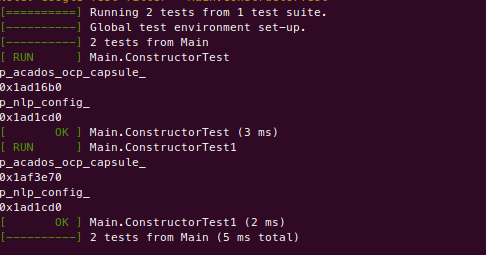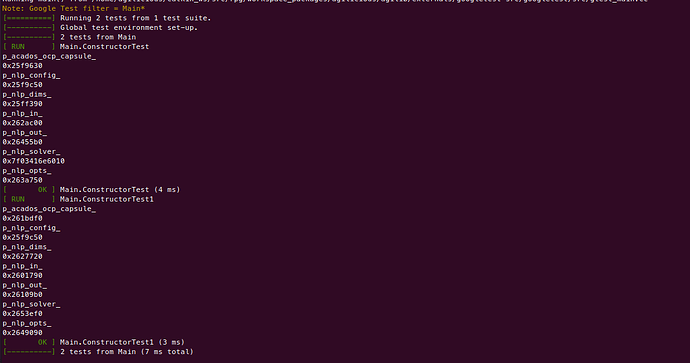Hi ![]()
I am using python to generate C code for an MPC controller and then use that C code in a C++ environment. Everything works as expected with my MPC. However, due to the unit tests of our high level framework, I have come to the realisation that something strange is happening with the destruction of pointers/capsule in the acados_solver_model files. The problem is the following:
- I have an object that, when constructed, calls the following functions:
p_acados_ocp_capsule_ = model_acados_create_capsule();
int status = model_acados_create(p_acados_ocp_capsule_);
p_nlp_config_ = model_acados_get_nlp_config(p_acados_ocp_capsule_);
p_nlp_dims_ = model_acados_get_nlp_dims(p_acados_ocp_capsule_);
p_nlp_in_ = model_acados_get_nlp_in(p_acados_ocp_capsule_);
p_nlp_out_ = model_acados_get_nlp_out(p_acados_ocp_capsule_);
p_nlp_solver_ = model_acados_get_nlp_solver(p_acados_ocp_capsule_);
p_nlp_opts_ = model_acados_get_nlp_opts(p_acados_ocp_capsule_);
std::cout << "p_acados_ocp_capsule_" << std::endl;
std::cout << p_acados_ocp_capsule_ << std::endl;
std::cout << "p_nlp_config_" << std::endl;
std::cout << p_nlp_config_ << std::endl;
This is the destructor of that same object (the prints are there for debugging purposes):
// Free solver
int status = model_acados_free(p_acados_ocp_capsule_);
if (status) {
printf("model_acados_free() returned status %d. \n", status);
}
// Free capsule
status = model_acados_free_capsule(p_acados_ocp_capsule_);
if (status) {
printf("model_acados_free_capsule() returned status %d. \n", status);
}
These pointers are defined in the header file as follows:
model_solver_capsule *p_acados_ocp_capsule_;
ocp_nlp_config *p_nlp_config_;
ocp_nlp_dims *p_nlp_dims_;
ocp_nlp_in *p_nlp_in_;
ocp_nlp_out *p_nlp_out_;
ocp_nlp_solver *p_nlp_solver_;
void *p_nlp_opts_;
Now, when executing my code normally I can run it without issues, it works as it’s supposed to and everything looks good. However, when doing very simple unit tests, I encounter that some of these unit tests fail. In particular, I noticed that when running the unit tests as a batch run, some fail. When running them individually, though, they run successfully. This has lead me to think that there is some memory leak somewhere in the creation/deletion of the capsule. To investigate further, I run these two unit tests, and check the addresses of the capsules created, and of the nlp_config object created.
TEST(MPC, ConstructorTest) {
Object_constructor()
}
TEST(MPC, ConstructorTest1) {
Object_constructor()
}
This is the output:

As you see, the pointer p_acados_ocp_capsule_ points to different memory addresses for different constructors, but the pointer p_nlp_config_ points to the same address in both instances, which hints somehow that these two tests are unintendedly sharing information. I have tried to debug why this is the case in the acados_solver_model.c file but I can’t seem to find what’s wrong.
Would appreciate to know if I am doing something wrong in the creation/destruction of the objects.
Best,
Angel.
